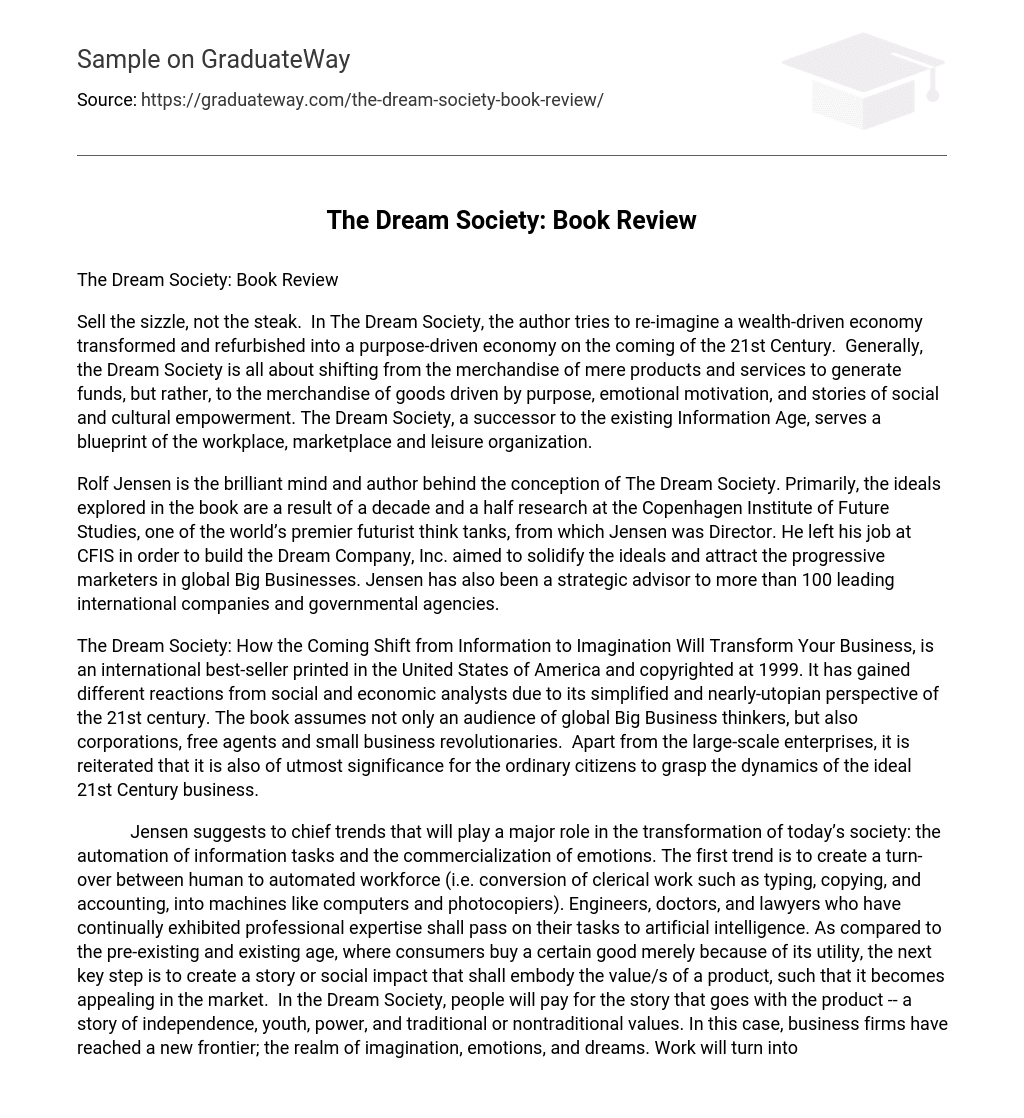Sell the sizzle, not the steak. In The Dream Society, the author tries to re-imagine a wealth-driven economy transformed and refurbished into a purpose-driven economy on the coming of the 21st Century. Generally, the Dream Society is all about shifting from the merchandise of mere products and services to generate funds, but rather, to the merchandise of goods driven by purpose, emotional motivation, and stories of social and cultural empowerment. The Dream Society, a successor to the existing Information Age, serves a blueprint of the workplace, marketplace and leisure organization.
Rolf Jensen is the brilliant mind and author behind the conception of The Dream Society. Primarily, the ideals explored in the book are a result of a decade and a half research at the Copenhagen Institute of Future Studies, one of the world’s premier futurist think tanks, from which Jensen was Director. He left his job at CFIS in order to build the Dream Company, Inc. aimed to solidify the ideals and attract the progressive marketers in global Big Businesses. Jensen has also been a strategic advisor to more than 100 leading international companies and governmental agencies.
The Dream Society: How the Coming Shift from Information to Imagination Will Transform Your Business, is an international best-seller printed in the United States of America and copyrighted at 1999. It has gained different reactions from social and economic analysts due to its simplified and nearly-utopian perspective of the 21st century. The book assumes not only an audience of global Big Business thinkers, but also corporations, free agents and small business revolutionaries. Apart from the large-scale enterprises, it is reiterated that it is also of utmost significance for the ordinary citizens to grasp the dynamics of the ideal 21st Century business.
Jensen suggests to chief trends that will play a major role in the transformation of today’s society: the automation of information tasks and the commercialization of emotions. The first trend is to create a turn-over between human to automated workforce (i.e. conversion of clerical work such as typing, copying, and accounting, into machines like computers and photocopiers). Engineers, doctors, and lawyers who have continually exhibited professional expertise shall pass on their tasks to artificial intelligence. As compared to the pre-existing and existing age, where consumers buy a certain good merely because of its utility, the next key step is to create a story or social impact that shall embody the value/s of a product, such that it becomes appealing in the market. In the Dream Society, people will pay for the story that goes with the product — a story of independence, youth, power, and traditional or nontraditional values. In this case, business firms have reached a new frontier; the realm of imagination, emotions, and dreams. Work will turn into play. Since, the industry has turned almost completely automated, jobs will be easier (i.e. managing computers or machines); thus, people will not work mainly for the money but for the satisfaction and dedication towards the task. The landscape will transform to a peaceful countryside, where animals are allowed to have a ‘decent’ life, and nature and wildlife will again be revered, with the premise of an automated environment. In such scenario, people will live in homes, eat in restaurants, and shop in malls, where robots serve them.
The aforementioned is nearly a utopian view of the 21st century. As wonderful as it may seem, this type of society has been demodulated, idealized, and simplified, in its basic premise that it appeals to scholars, businessmen, and citizens altogether solely for the inherent beauty in its simplicity, but when applied to realistic perspectives, it can be hardly achievable. Modern business and economics is so complex that such a wonderful and simple ideology can be very dangerous when differing interests from diverse countries, culture, and enterprise collide.
References
Jim Salmons and Timlynn Babitsky for Sohodojo. (2004, October 1). Review: Storytelling and
the Rise of Imagination. Retrieved August 8, 2010 from http://sohodojo.com/ribs/dream-
society.html





